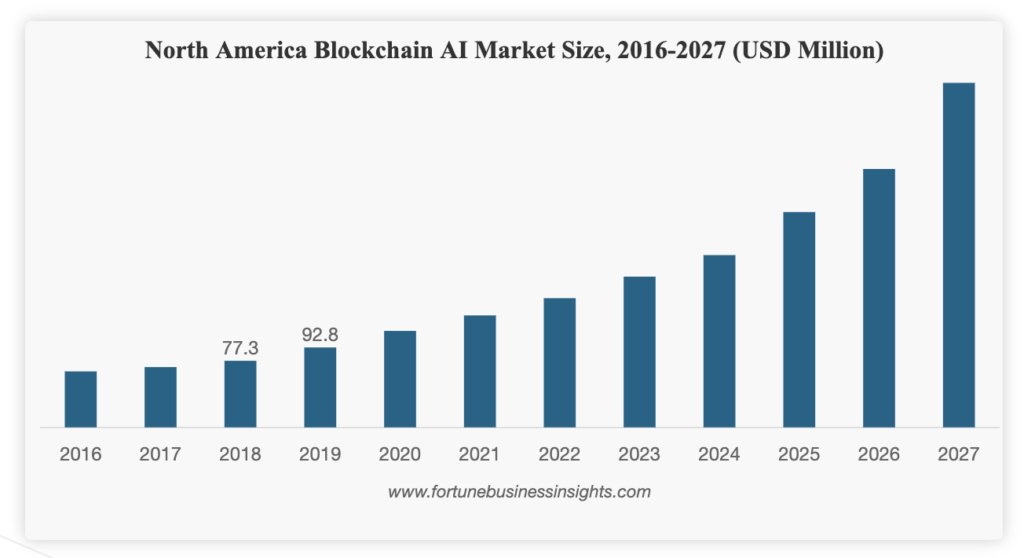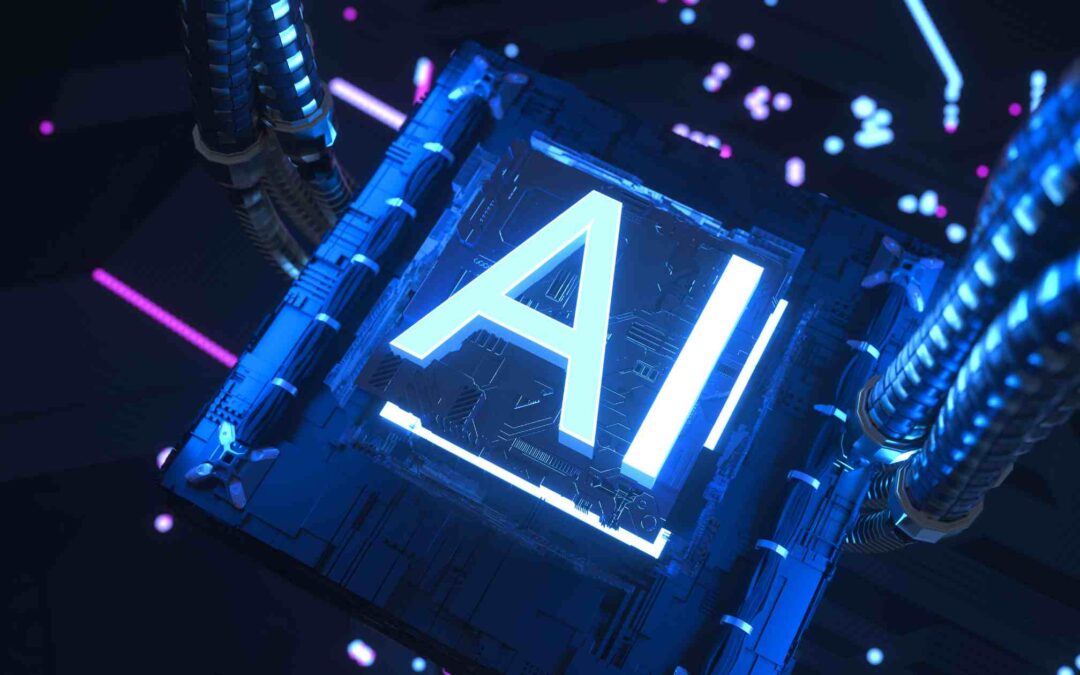As the dawn of the new digital age ushers in, the synergy of blockchain and artificial intelligence (AI) is transforming multiple industries. These cutting-edge technologies are not just trending buzzwords, but robust tools that promise to revolutionize business operations, data security, and decision-making processes.
Blockchain and AI in financial services
Blockchain and Artificial Intelligence (AI) are combining to revolutionize the financial industry. Financial institutions handle massive amounts of data, and AI and blockchain can manage this data more efficiently.
By automating processes and examining data on the blockchain, these institutions can improve risk management and compliance. For example, AI algorithms can sift through financial data on the blockchain to detect potential fraud and money laundering. Here, blockchain technology guarantees that the data is safe and unalterable.
Take FactSet, a global provider of financial data and analysis software, for instance. They’re using AI and blockchain to enhance their risk management and compliance processes. AI algorithms are used to scrutinize the company’s financial data housed on a blockchain to identify potential fraud and other irregularities. At the same time, the company’s blockchain technology safeguards the algorithms and data.
Blockchain and AI in supply chains
Beyond finance, AI and blockchain have other valuable uses. In the transport sector and other industries, AI can boost the efficiency and transparency of supply chains.
AI algorithms can analyze data on the blockchain to identify supply chain inefficiencies, helping companies optimize their operations. Simultaneously, blockchain technology ensures the transparency and traceability of products in the supply chain by maintaining records of logistics documents and ensuring visibility of goods’ locations.
Blockchain and AI in healthcare
In healthcare, AI and blockchain can bring significant improvements. AI, by analyzing medical data on the blockchain, can help identify patterns in patient data, aiding doctors in making accurate diagnoses and treatments. The blockchain technology can be used to safeguard patient data, an essential requirement in healthcare.
Blockchain and AI in life sciences
Blockchain and AI are joining forces in the life sciences field, particularly in the pharmaceutical industry, to significantly enhance operations. They offer much-needed transparency and tracking abilities for the drug supply chain while significantly boosting the success rate of clinical trials.
By combining AI’s advanced data analysis capabilities with blockchain’s decentralized structure, these technologies bring about increased integrity and transparency to clinical trial data. They facilitate better patient tracking and consent management, along with automating the process of trial participation and data collection. In simple terms, AI digs deep into data to uncover valuable insights, while blockchain ensures that this data is securely stored and transparently managed, boosting the overall effectiveness of clinical trials.
Blockchain and AI in security and verification
Blockchain acts as a robust protective layer for AI systems with its encryption-backed, decentralized structure. This allows AI developers to set specific access parameters for AI, enforced by private keys and tamper-proof infrastructure like blockchains and smart contracts. Unlike centralized systems vulnerable to a single point of failure, a decentralized blockchain system is spread across multiple nodes and keys, making it harder for a single attacker to compromise the system.
This synergy between AI’s utility and blockchain’s security reduces attack possibilities, enhancing the safety of AI applications. It empowers organizations to harness AI’s full potential while maintaining high security standards supported by cryptographic assurances.
Blockchain also plays a vital role in verifying the authenticity of different media types, an aspect particularly crucial with the rise of deep learning models that can generate images and media from text prompts. These models, while promoting productivity and creativity, could be misused to spread misinformation or create deceptive synthetic media.
Blockchain technology, backed by cryptography and encryption, can validate the authenticity of a piece of content by verifying its origin and any alterations. Cryptographic watermarking, for example, can ensure tamper-proof timestamping.
In a future where distinguishing between AI- and human-generated content is crucial for societal stability, blockchain could facilitate the creation of decentralized platforms for content verification and distribution. It ensures that the spread media is unaltered, authentic, and has a transparent, verifiable history.
Non-fungible tokens (NFTs), unique digital assets on the blockchain, can also help verify the authenticity and provenance of digital content. NFTs can represent ownership and verify the origins of various media forms. When content is minted as an NFT, its origin, ownership history, and modifications become transparent and easily verifiable. This adoption can enhance online content accountability, helping differentiate between genuine and tampered content.
AI in cryptocurrency
AI (artificial intelligence) plays a significant role in the world of cryptocurrencies by aiding in market analysis, enhancing monetization insights, automating trading strategies, and predicting market trends.
Firstly, AI uses sentiment analysis to gauge public feelings towards specific cryptocurrencies. Using natural language processing, AI can sift through large volumes of data from the internet and blockchain, and analyze the sentiment—negative, neutral, or positive—quickly. This can help predict potential price changes, offering valuable insights for investors.
Secondly, AI can provide more profound insights into cryptocurrency monetization. Given the vast amount of unstructured data online, AI assists data scientists in producing clean, relevant data for traders, making it easier to spot valuable investment opportunities.
AI also plays a role in fully automated trading strategies for cryptocurrencies. High-frequency trading, in which a computer executes numerous orders in fractions of a second, often relies on AI to mimic human intelligence. This speedier trade execution gives investors an edge over slower competitors.
Lastly, AI aids in accurately predicting cryptocurrency market trends. With the increasing number of investment options, AI is becoming an essential tool in the financial industry.
Large financial firms already use AI in their workflows to discover new investment opportunities and buy/sell signals, with smaller businesses following suit. Combined with blockchain, AI becomes an even more powerful tool for predicting market trends.
How can blockchain improve AI?
Blockchain technology can significantly enhance AI in several ways. Firstly, by boosting trust. Blockchain’s permanent, transparent records can help explain how AI algorithms work and reveal the source of their data, enhancing people’s confidence in AI’s data integrity and recommendations.
Secondly, blockchain’s decentralized data storage can increase data security and integrity. It acts as an audit trail, allowing users to understand how their data is used. If AI models are stored on blockchains, their decisions become more accountable and transparent.
Thirdly, blockchain can help AI expand by providing access to both internal and external data. This enables more actionable insights, better data management, and shared models, potentially creating a more trustworthy and transparent data market.
Fourthly, the fusion of AI and blockchain can automate multiparty business processes, reducing the need for human intervention. Blockchain technology can eliminate unnecessary third parties from transactions, accelerating their speed and efficiency. This reduces transaction friction and enables individuals to own their data, while blockchain secures the transaction process.
Lastly, blockchain can assist with AI’s high computational power demands. As a distributed ledger technology, it can utilize the computing power of multiple machines, an asset that centralized data servers may struggle to provide. In essence, integrating blockchain with AI can lead to more trustworthy, transparent, efficient, and powerful AI systems.
According to this report from Fortune Business Insights, the blockchain and AI market is expected to grow to over $973.6 million in 2027, “at a CAGR of 23.6% in the 2020-2027 period.”

Companies using AI and blockchain
- CertiK. Provides tools powered by AI and formal verification to secure blockchain, smart contracts, and Web3 applications. With its product suite, CertiK technology helps identify security risks, monitor data insights, and visualize where crypto funds are going.
- Core Scientific. Integrates personalized blockchain and AI infrastructure with current business networks, upgrading a business’ physical infrastructure, servers, and software in the process. The facilities are designed for long-term digital asset mining and to maximize hashrate, always running at optimal efficiency to reduce energy and time consumption.
- Token Metrics. A tool that uses AI to analyze cryptocurrency trends for personal investment purposes. The technology scans the data of over 6,000 crypto and NFT projects and extracts market insights to help users make investment decisions.
- AI BlockChain. Hosts a digital asset cloud platform built on blockchain and AI. The company applies artificially intelligent agents to its blockchain to detect changes and ensure platforms are secure.
- Bext360. Uses AI and blockchain to boost supply chain transparency and efficiency in the coffee, timber, seafood, and mineral industries. The AI analyzes crops and predicts growing patterns, while blockchain ensures the recording of a product’s supply chain from seed to finished product.
- Blackbird.AI. Uses its blockchain and artificial intelligence to gauge the credibility of news content in the communications and information industries.
- BurstIQ. The LifeGraph platform combines AI and blockchain technology to provide enhanced ownership and management over patient data.
- Chainhaus. A blockchain and AI advisory, education, and software development firm. The company provides a variety of end-to-end solutions for everything from teaching and app development to research and capital raising.
- Cyware. Incorporates AI and blockchain-based tools into its cybersecurity and threat intelligence solutions.
- Dobby. A home services platform for homeowners seeking assistance with maintenance or repair projects. The AI-based application operates on blockchain technology to exchange data quickly and reduce any financial loss.
- Figure. Uses blockchain and artificial intelligence to streamline the home loan process. The platform offers home equity line of credit loan options, investment marketplaces and its own digital money app called Figure Pay.
- Gainfy. A healthcare platform that employs blockchain, AI and IoT devices to improve the industry experience.
- Hannah Systems. Brings AI and blockchain to autonomous vehicles with its portfolio, including an AI-powered data exchange platform, a real-time mapping tool, an insights dashboard, and blockchain.
- Hashed Health. A venture studio based on blockchain that elevates startups in the healthcare industry.
- Home Lending Pal. An application for home mortgage advising, comparison, and more. The AI-based platform allows users to view local homes, calculate personal budgeting, and choose their preferred home lender based on related mortgage rates.
- Imaginovation. Builds and hosts customer-centric applications for clients in need. Utilizing solutions from blockchain, AI, IoT, AR, and VR, applications can be created for purposes ranging from manufacturing to entertainment.
- LeewayHertz. Helps businesses create Web3-focused software platforms.
- MOBS. A blockchain-based video marketplace for the selling and buying of smartphone videos. The blockchain creates a smart contract that directly allocates money to the content creator based on engagement rates and views.
- NetObjex. Merges blockchain and AI to host its NFT marketplace platform, where users can create their own marketplaces and digital wallets as well as host metaverse events.
- Neureal. A prediction engine that combines AI, blockchain, and cloud technologies to predict everything from the stock market to Google searches.
- Numerai. A decentralized hedge fund at which data scientists from all over the world are constantly working on AI problems.
- Stowk. A blockchain-based platform that features AI tools for almost every part of a business’s operations, streamlining everything in supply chain management from data access and IT governance to procurement.
- Verisart. Uses artificial intelligence and blockchain to help create and certify NFT work in real-time.
- Vytalyx. A healthtech company using AI to give healthcare professionals blockchain-based access to medical intelligence and insights.
- WealthBlock. An automated marketing and messaging SaaS platform for businesses raising capital. Blockchain powers the company’s investor referral and suitability checking process.
- WorkDone. Helps businesses automate daily processes and discover insights to retain employees. The company specializes in machine learning and blockchain to seek out resource bottlenecks, analyze best management practices, and continually maintain service compliance.

